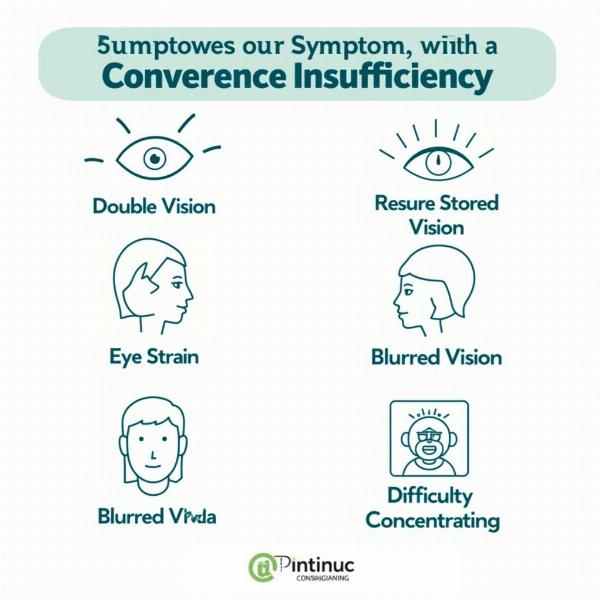Convergence defect, a term often encountered in ophthalmology, refers to the eyes’ inability to work together to focus on a single object. This can lead to double vision, eye strain, and headaches. Understanding its meaning in Hindi and the related nuances can be crucial for effective communication and treatment. This article will delve deep into the meaning, causes, symptoms, and treatment options for convergence insufficiency.
Understanding “Convergence Defect” in Hindi
The Hindi translation for convergence defect is अभिसरण दोष (abhisaran dosh). अभिसरण (abhisaran) means convergence, and दोष (dosh) signifies defect or insufficiency. Therefore, अभिसरण दोष directly translates to “convergence insufficiency” or “convergence defect.” While this is the most common and technically accurate translation, other terms might be used colloquially depending on the specific context and regional variations. For instance, some might refer to the symptoms, like double vision (दोहरी दृष्टि – dohari drishti), rather than the underlying condition.
Causes of Convergence Insufficiency (अभिसरण दोष)
Convergence insufficiency can stem from various factors. Sometimes, it’s a result of problems with the eye muscles responsible for inward movement. In other cases, it can be linked to neurological conditions or other underlying health issues. Understanding the root cause is essential for effective treatment. Some common causes include:
- Eye Muscle Weakness: The extraocular muscles, specifically the medial rectus muscles, may be weak or underdeveloped, hindering their ability to pull the eyes inwards for near vision.
- Neurological Issues: Certain neurological conditions can disrupt the coordination between the eyes, leading to convergence problems.
- Head Trauma: Injuries to the head can sometimes affect the nerves and muscles controlling eye movement.
- Stress and Fatigue: While not a direct cause, prolonged stress and fatigue can exacerbate convergence insufficiency symptoms.
Symptoms of Convergence Insufficiency
Identifying convergence insufficiency is crucial for timely intervention. Common symptoms include:
- Double Vision (दोहरी दृष्टि): Seeing two images of a single object, especially at near distances.
- Eye Strain: Experiencing discomfort, tiredness, or pain in the eyes, particularly during reading or close-up work.
- Headaches: Frequent headaches, often triggered by prolonged near vision tasks.
- Blurred Vision: Difficulty focusing on near objects, leading to blurry or unclear images.
- Difficulty Concentrating: Struggling to maintain focus during reading or other near-vision activities.
 Symptoms of Convergence Insufficiency
Symptoms of Convergence Insufficiency
Treatment Options for अभिसरण दोष
Fortunately, several treatment options are available for convergence insufficiency:
- Eye Exercises: Specific eye exercises, like pencil push-ups or Brock string exercises, can strengthen eye muscles and improve convergence.
- Prism Glasses: Prescribed prism glasses can help realign the images and alleviate double vision.
- Vision Therapy: A structured program of visual activities and exercises guided by a vision therapist can enhance eye coordination and convergence skills.
- Surgery: In rare cases, surgery might be considered to correct the muscle imbalance, though this is typically a last resort.
Living with Convergence Insufficiency
While convergence insufficiency can be disruptive, proper management allows individuals to lead normal lives. Regular eye checkups, adherence to prescribed treatments, and lifestyle adjustments can significantly improve symptoms and quality of life.
Conclusion
Understanding “convergence defect meaning in Hindi” as अभिसरण दोष is essential for anyone experiencing related symptoms. Early diagnosis and appropriate treatment can significantly improve visual comfort and overall well-being. Don’t hesitate to consult an ophthalmologist if you experience any symptoms of convergence insufficiency.
FAQ
- What is the meaning of convergence defect in simple terms? It’s the inability of the eyes to work together effectively to focus on a single object.
- Is convergence insufficiency a serious condition? While not life-threatening, it can significantly impact daily life and should be addressed.
- Can convergence insufficiency be cured? With proper treatment and management, many individuals experience significant improvement or complete resolution of symptoms.
- How is convergence insufficiency diagnosed? An ophthalmologist will conduct a comprehensive eye exam to assess eye movements and convergence abilities.
- What are the long-term effects of untreated convergence insufficiency? Untreated convergence insufficiency can lead to chronic eye strain, headaches, and difficulty with near-vision tasks.
- How can I find a qualified ophthalmologist for convergence insufficiency treatment? You can ask your primary care physician for a referral or search online for ophthalmologists specializing in binocular vision disorders.
- Are there any home remedies for convergence insufficiency? While home remedies might provide temporary relief, it’s crucial to seek professional medical advice for accurate diagnosis and effective treatment.
About Meaning-Hindi.in
Meaning-Hindi.in is your trusted partner for accurate and culturally sensitive Hindi translation services. We offer a wide range of services, including business and commercial document translation, certified and legal document translation, technical and user manual translation, website and localization translation, educational and academic document translation, express translation, and specialized industry translation. Our expert team understands the nuances of both Hindi and other languages, ensuring precise and reliable translations for all your needs. For a free quote or to discuss your project, contact us at [email protected] or call us at +91 11-4502-7584. Connect with Meaning-Hindi.in today for all your translation needs.